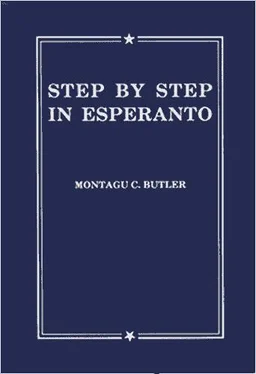992. ** La patrino iris al tirkesto ( drawer ), elprenis tablotukon, malfaldis ĝin, kaj ĝin sternis sur la tablo. Ŝi iris al ŝranko, kaj prenis el la ŝranko telerojn, tasojn, kaj subtasojn (tastelerojn), kiujn ŝi aranĝis bonguste. Sur ĉiun subtason ŝi metis tason kaj kuleron. Flanke de ĉiu telero ŝi metis tranĉilon kaj forkon— la tranĉilon dekstre, la forkon maldekstre. Ŝi alportis salaton, fromaĝon, frukton, kaj buterpanon. Ŝi portis ankaŭ la buterujon, la sukerujon, la salujon, la piprujon, kaj la mustardujon. Ŝi metis buteron en la buterujon,… k.t.p. Fine ŝi alportis kafon en kafujo kaj kremon en kremujo. La manĝo estis preta, kaj ŝi alvokis la familion.
(2) Countries and Their Inhabitants
993. (2) LAND: Anglujo(or, Anglolando), England; Svisujo(or, Svislando), Switzerland (117).
Polo, a Pole; Polujo, Poland; Polujano, an inhabitant of Poland (not necessarily a Pole).
994. THE FOLLOWING ROOTS DENOTE THE LAND.
Form from them the name of the inhabitant by adding ano,thus: Azio, Asia; Aziano, an Asiatic.
Afrik Alĝeri Amerik Argentin Azi Aŭstrali Bolivi Brazil Ĉil [95]Finland Grenland [96]Irland Island Kanad Kolombi Lapland Malt Marok Nederland Novzeland Palestin Peru Siberi Tasmani Tunizi Urugvaj Uson Venezuel
995. THE FOLLOWING ROOTS DENOTE THE INHABITANT.
Form from them the name of the land by adding ujoor (o)lando,thus: Svedo, a Swede; Svedujo, Svedlando, Sweden (117). [97]
Angl Arab Aŭstr Bavar Belg Brit Bulgar Dan Egipt Eston Franc German Grek Hind Hispan Hungar Ital Japan Jugoslav Katalun Kimr Latv Litov Norveg Pers Pol Portugal Prus Ruman Rus Saks Serb Skot Svis Turk
996. (a) Kiun lingvon oni parolas, kiam oni estas en Francujo?— Germanujo? (Kiam oni … oni parolas France.) Kie loĝas la Poloj? la Italoj? Kie estas Londono? Novjorko? Glasgovo? Kolonjo? Parizo? Egiptujo? Japanujo? Esperantujo?
(b) Kiam oni kutime parolas Angle (France, k.s.)? (… kiam oni estas en Anglujo.) Kie oni kutime parolas Angle? En Anglujo.
997. (3)Fruit-Bearing Plant
Pomujo, apple-tree; frambujo, raspberry-bush; fragujo, strawberry-plant. [98]
This use of ujois rare. It is ambiguous, for pomujomight also mean an apple basket or barrel. Pom-arbo, framb-arbusto( bush ), frag-planto,are usually preferable.
998. The suffix ‑INGdenotes that in which an object is set or put, a holder (for one object only). Usually the object fits closely, held at one end only. Ingo, holder, socket, sheath, stand. Cigaringo, cigar-holder; kandelingo, candlestick. Kandelingaro, kandelingisto. Fingringo( a thimble ) holds one finger at one end!
Cp. IN it GOes; also ‑ujo (989).
Elingigi( draw, unsheathe ) glavon.
999. With the roots cigared, dent, glan,glav, (kap)kusen, krajon, ombrel, ov, pied, pint, plum, sabr, translate: cigarette-holder, socket of a tooth, acorn-cup, scabbard, pillow-case, pencil-holder, umbrella-case, egg-cup, stirrup, ferrule, penholder, sabre-sheath.
1000. The suffix ‑EBLdenotes possibility: ‑ebla= able to be ‑ed, that can (may) be ‑ed, ‑able, ‑ible (in this sense).
Kantebla, possible to be sung, singable; videbla, visible; ricevebla, to be had; ebla, possible, eble, perhaps. Eble li venos, he may (might) come. Malebla, impossible. (Estas) Kompreneble! Of course, as may be understood (102).
1001. Palpebla mallumo. Neevitebla danĝero. Amikoj nedisigeblaj. Tio ne estas kredebla. Faru vian eblon. Nenio plu estas farebla. Esperanto estas lingvo fleksebla; facile lernebla ( easy to learn), uzebla, kaj memorebla. Kiel la sablo de la maro, nemezurebla kaj nekalkulebla. Mi iros sur vojon nereveneblan. Aferoj grandaj kaj neatingeblaj por mi. Arbo maljuna ne estas fleksebla. Tuso kaj amo ne estas kaŝeblaj. Progresi laŭeble. Ne transnaĝeble! Ne transireble!
1002. “Ĉu la edzino vin insultas (376), kiam vi venas hejmen malfrue?” “Neniam!” “Kiel tio eblas?” “Mi estas fraŭlo.”
“Kion signifas Ne Transdonebla sur la koncertabileto?” “Tio signifas, ke se vi ne iros mem, oni ne enpermesos vin.”
Trans arbaro, trans herbejo,
Lumas la matena sun’;
Mole, bene, nesenteble,
Maja roso falas nun.
Sanktan ĉarmon de printempo,
Junan verdon de foli’,
Bonodorojn, belajn florojn,
Portas Maja ros’ al ni.
1004. (a) Aranĝ- (evit ‑far- hav- imag- laŭd- leg- mov- pag- romp- trov- travid‑)ebla. Ne-forig(‑revenig ‑kontraŭdir‑)ebla. Neplibonigeblulo, manĝeblaĵo, malebligi, videbliĝi, neforgeseblulino.
(b) Cp. ‑eblecowith English -ability, ‑ibility. (Aŭd- digest-fleks- kompren- komunik- kred- penetr- port- refut- solv- ten‑)ebleco.
1005. The suffix ‑INDdenotes worthiness, merit; worth, value.
‑inda= (a) worthy to be ‑ed, - worthy, deserving of; (b) worth ‑ing.
(a) Atentinda, worthy of attention; fidinda, trustworthy, dependable; kompatinda, p o or, to be pitied; timinda, awful, formidable; hontinda, shameful; mirinda, wonderful; ridinda, ridiculous.
Often ‑indamay be translated by - able. E.g., abomeninda, abominable. Similarly: admir- (ador- akcept- am- bedaŭr- (102) dezir- envi- estim- honor- konsider- laŭd- memor- prefer- respekt- rimark‑)inda.Do not confuse these with the corresponding forms in ‑ebla. (1000).
(b) Aĉetinda, worth buying. Similarly: dir-(diskut- gajn- hav- help- leg- lern- manĝ- konserv- pres- prov- respond- sav- sci- skrib- trink- vid‑)inda.
(c) Inda je, worthy of; neinda, unworthy; malinda, base. Mi ne indas, I am not worthy. Penindas (Estas peninde) iri, it is worth while going. Indo, worthiness, merit; worth, value.
1006. Mi ne indas tian honoron. Honorinda morto estas preferinda ol hontinda vivo. Senpova kolero — ridinda afero. Akiro de prudento estas preferinda ol arĝento. Fremda mizero — ridinda afero. De majesta ĝis ridinda estas nur unu paŝo. Kaj Bruto estas honorinda homo!
Читать дальше












